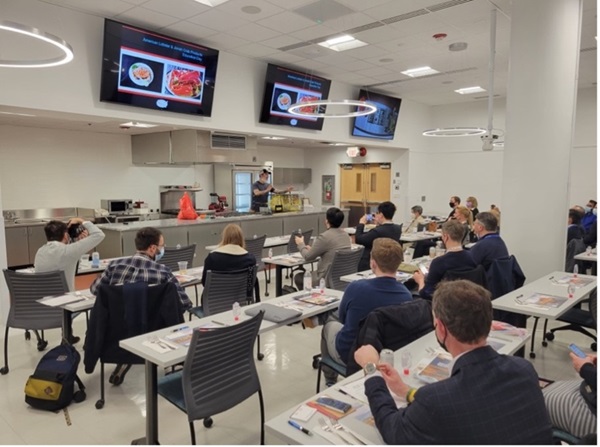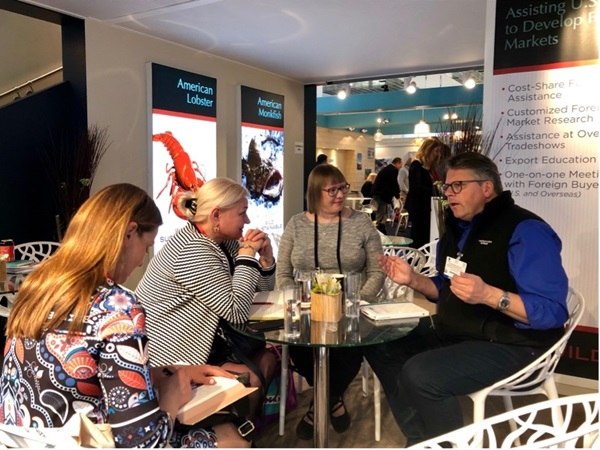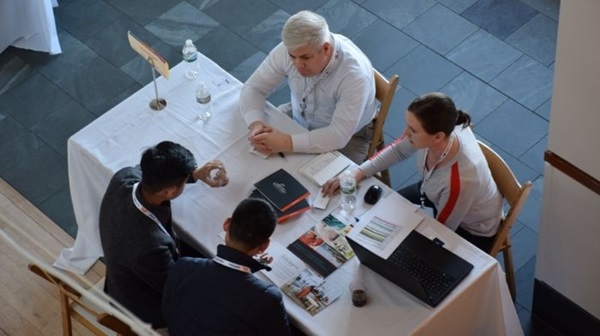Food Export's network of In-Market Representatives can be a huge asset for Northeast seafood suppliers. If you’re not familiar with how our IMRs operate, here is an overview of what they bring to the table.
Food Export’s long-term investment in building a network of In-Market Representatives (IMR) brings numerous benefits to U.S. suppliers. If you’re not familiar with how our IMRs operate and how they can help you, below is an overview of what they bring to the table.

Maintaining and Building Lasting Relationships
One of the primary roles that an IMR plays is to maintain and build relationships with the trade in their markets. According to Colleen Coyne, Seafood Program Coordinator for Food Export–Northeast, “Many of our IMRs have been with us for decades and have
long-standing in-market relationships. It’s that consistency that makes everything more efficient and effective. They truly have a pulse on the market. Having these long-standing relationships is a unique offering for Northeast suppliers.”
In order to deliver the most accurate information to their markets about Northeast seafood, IMRs stay up to date on product details through webinars or learning sessions provided by Food Export–Northeast. Continuous education is key to maintaining existing relationships and to building new connections. Because so many IMRs have worked with Food Export for years, suppliers can trust the market intelligence IMRs offer to gain insight into the competitive landscape.
Alexander Wever, the Seafood In-Market Representative for Northern and Eastern Europe, shares his strategy on maintaining trade contacts. “I try to visit with importers in person or meet with them at seafood fairs regularly,” Wever explained. “It’s important to maintain transparency and communicate so that importers and buyers can lean on me as a resource. We speak the same ‘seafood language,’ if you will. I lend them my knowledge and insights of Northeast U.S. seafood, which they deem very valuable and, the majority of the time, actionable.”
Providing Market Intelligence and Insight
As knowledgeable industry experts, In-Market Representatives can provide accurate market intelligence and key insight to suppliers so they can determine if their products are a good fit for the market. Additionally, IMRs leverage and maintain close relationships with the local office of the USDA’s Foreign Agricultural Service (FAS), also called the “Post.” If trade issues arise, they’re available to gather that information and bring it back to the larger organization so that efforts can be made to resolve them. For example, Wever works with the USDA/FAS Posts in Germany and Poland and, through these relationships, has been invited to present Northeast seafood at trade events promoting U.S. food and agricultural products they organize. The relationships that IMRs have with the FAS Posts in their markets expands opportunities for Northeast U.S. seafood to garner global attention.
IMRs also play an important role in many Food Export-Northeast programs including:
Nominating Qualified Purchasers for Buyers Missions & Focused Trade Missions
Participating in Food Export–Northeast’s Buyers Missions and Focused Trade Missions is a great way for overseas buyers to learn about Northeast seafood products. Part of an IMR’s role is to select the best buyers for these missions. The focus is on inviting buyers who are interested in products being showcased, and building connections that will eventually generate sales for suppliers.
In Wever’s case, “There is no standard waiting list, but rather a group of buyers from various markets with different product interests.” He notes, “When I invite them to one event, I ask them if they would be interested in future ones, so I always have a pool of interested buyers for upcoming missions. It’s a continuous process.”

Boots on the Ground
Because IMRs live and work in the markets they represent, they are the “boots on the ground” for Northeast seafood products. Through Food Export–Northeast’s program Food Show PLUS!™, IMRs can enhance your international tradeshow results with introductions to qualified buyers, in-market briefings, on-site assistance, self-guided retail tours and post-show lead qualifications. By leveraging the buyer relationships and local market expertise of our In-Market Representatives, you will gain a competitive edge over other exhibitors – resulting in getting more qualified leads from serious buyers. Key services include:
IMRs also make time to visit other industry missions and trade shows that take place in their markets to help stay up to date on best practices and current trends. While they may not be exhibiting at these shows, they’re still working the room, networking, and examining potential competitors.
Vetting Trade Leads
Vetting trade leads for Northeast suppliers is another important role for IMRs. We asked Wever about his process. “Vetting trade leads involves identifying the specific seafood products, quantities and product specification that a potential importer is seeking.” Food Export takes these qualified leads, matches them with exporters of the product of interest, and disseminates trade leads to all active suppliers. From there, it is up to the importer and exporter to establish contact and pursue potential business opportunities. Throughout the process, Wever maintains open communication with both parties to ensure a smooth and successful transaction.

The Bottom-line Benefits of IMRs
In-Market Representatives can provide seafood suppliers with a wealth of market knowledge and insight. Food Export’s IMRs are a unique network of trade marketing consultants from all over the world who are truly the connectors for suppliers and buyers. According to Coyne, “It’s a unique 360-degree relationship. Our IMRs know they have our support, so they continue to build those essential bridges for our suppliers.”
About Food Export USA–Northeast
With its extensive programs and educational offerings, Food Export USA–Northeast (Food Export–Northeast) is recognized as the preeminent expert and cost-effective resource for northeast seafood and agricultural suppliers looking to sell their products overseas. Founded in 1973, Food Export–Northeast is a non-profit organization that works collaboratively with its 10 member states’ agricultural promotion agencies from Connecticut, Delaware, Maine, Massachusetts, New Hampshire, New Jersey, New York, Pennsylvania, Rhode Island and Vermont, to facilitate trade between suppliers and worldwide importers and to promote the export of food, agricultural and seafood products from those states. The organization is funded through the Market Access Program (MAP), administered by the USDA’s Foreign Agricultural Service.
Learn more about us and what we do for the Northeast seafood industry here. Contact us.
Your Connection To Growth®
©2025 Food Export Association of the Midwest USA and Food Export USA–Northeast. All Rights Reserved.
Food Export–Midwest and Food Export–Northeast prohibits discrimination in all its programs and activities on the basis of race, color, national origin, religion, sex, gender identity (including gender expression), sexual orientation, disability, age, marital status, familial/parental status, income derived from a public assistance program, political beliefs, reprisal or retaliation for prior civil rights activity. (Not all bases apply to all programs.) Persons with disabilities who require reasonable accommodations or alternative means of communication for program information (e.g., Braille, large print, audiotape, American Sign Language, etc.) should contact us. Additionally, program information may be made available in languages other than English.
To file a program discrimination complaint, complete the USDA Program Discrimination Complaint Form, AD-3027, found online https://www.ascr.usda.gov/filing-program-discrimination-complaint-usda-customer.
Food Export–Midwest and Food Export–Northeast reserve the right to deny services to any firm or individual which, in the sole opinion of Food Export–Midwest and Food Export–Northeast, does not comply with FAS, MAP or Food Export–Midwest and Food Export–Northeast regulations or policies, or otherwise offer the best opportunity to achieve its mission of increasing food and agricultural exports. Submission of any false or misleading information may be grounds for rejection or subsequent revocation of any application or participation. Food Export–Midwest and Food Export–Northeast are equal opportunity employers and providers.
